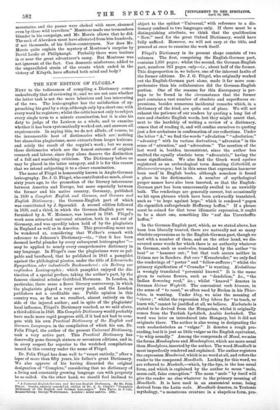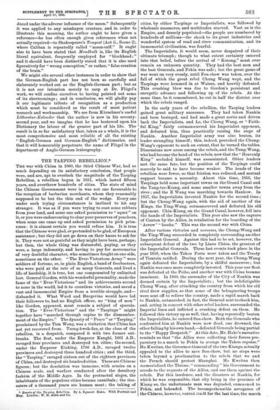THE NEW EDITION OF FIXTGEL.* NEXT to the tediousness of
compiling a Dictionary comes undoubtedly that of reviewing it ; and we are not sure whether the latter task is not the more laborious and less interesting of the two. The lexicographer has the satisfaction of ap- proaching his goal by a step, although only by a short one, with every word he registers ; whilst the critic has not only to subject every single term to a minute examination, but it is also his duty to judge of the Lexicon as a whole, and to examine whether it has been systematically worked out, and answers all requirements. In saying this, we do not allude, of course, to the innumerable host of dictionaries which are;i nothing but shameless plagiarisms, mere extracts from larger lexicons, and solely the result of the copyist's work ; but we mean those dictionaries which are the honest outcome of original research and labour, since they alone deserve the distinction of a full and searching criticism. The Dictionary before us may be placed in the latter category, and it is for this reason that we intend subjecting it to a closer examination.
The name of Fliigel is honourably known in Anglo-German lexicography. Dr. J. G. Fliigel, who contributed so much, about sixty years ago, to the promotion of the literary intercourse between America and Europe, but more especially between the former and his native country, Germany, published in 1830 a Complete English and German, and German and English Dictionary ; the German-English part of which was contributed by J. Sporschil. A second edition followed in 1838, and a third, in which the German-English part was furnished by A. W. Meissner, was issued in 1848. Fliigel's work soon attracted universal attention, both in and out of Germany, and was speedily taken hold of by the plagiarists in England as well as in America. This proceeding must not be wondered at, considering that Walker's remark with reference to Johnson's Dictionary—viz., " that it has been deemed lawful plunder by every subsequent lexicographer "- may be applied to nearly every comprehensive dictionary in any language. In Fliigel's case the plagiarisms were so pal- pable and barefaced, that he published in 1843 a pamphlet against the philological pirates, under the title of Literarische Sympathien, oder industrielle Buchmacherei : ein Beitrag cur englischen Lexicographie ; which pamphlet enjoyed the dis- tinction of a special preface, taking the author's part, by the famous classical scholar Gottfried Hermann. In London, in particular, there arose a fierce literary controversy, in which the plagiarists played a very sorry part, and the London publishers not a creditable one. Public opinion in this country was, as far as we recollect, almost entirely on the side of the injured author; and in spite of the plagiarists' local influence, Fliigel's Dictionary reached, as we said above, a third edition in 1848. His Complete Dictionary would probably have made more rapid progress still, if it had not had to com- pete with his own Practical Dictionary of the English and German Languages, in the compilation of which his son, Dr. Felix Fliigel, the author of the present Universal Dictionary, took a very active part. This Practical Dictionary has deservedly gone through sixteen or seventeen editions, and'is, in every respect far superior to the wretched compilations issued in this country under the name of Fliigel.
Dr. Felix Fliigel has done well to "recast entirely," after a lapse of more than 'fifty years, his father's great Dictionary. We also approve of his having discarded the original designation of " Complete," considering that no dictionary of a living and constantly growing language can with propriety be so called. On the other hand, we should feel inclined to
• A Universal English-German and German-English Dictionary. By Dr. Felix Msg. Fourth, entirely remodelled. edition of Dr. J. G. FlOgel'P "Complete Dictionary of the English and German Laninages." Two Parts, in 3 vols. Bratuischweig : George Westerman. London : Asher and Co. 1891.
object to the epithet "Universal," with reference to a dic- tionary confined to two languages only. If there must be a distinguishing attribute, we think that the qualification " New," used for the great Oxford Dictionary, would have fully sufficed. However, we will not carp at the title, and proceed at once to examine the work itself.
Fliigel's Dictionary in its present shape consists of two volumes. The first, comprising the English-German part, contains 1,816 pages; whilst the second, the German-English part, numbers 923 pages only-i.e., about half of the former. This disproportion is, we believe, one of the inherent faults of the former editions. Dr. J. G. Fliigel, who originally worked out the English-German part alone, made it far more com- prehensive than his collaborators did the German-English portion. One of the reasons for this discrepancy is per- haps to be found in the circumstance that the former part contains a vast number of obsolete and superfluous ex- pressions, besides numerous incidental remarks which, in a dictionary of the kind, are quite out of place. We will not exhaust the patience of our readers by quoting a long list of rare and obsolete English words, lest they might assert that, next to the hardship of writing a review of a dictionary, comes that of reading it, and will confine ourselves to quoting just a few archaisms in confirmation of our reflections. Under the letter "A," we find the words " advolation " " advoltition," " advoutry " with its various derivatives, " adversion " in the sense of " attention," and " advocatess." The mention of the last word is, besides, inconsistent, since the author has omitted the equally obsolete term " advocatrix," having the same signification. We also find the Greek word agalma registered as an archeological term denoting Gotterbild, or Steinverzierungen ; but in this sense that expression has never been used' in English books, although somehow it found a place in the dictionaries. A number of mythological proper names have also been inserted, so that the English- German part has been unnecessarily swelled to an unwieldy bulk. The renderings are generally correct, but occasionally we hit upon phrases which have been awkwardly translated, such as " to hope against hope," which is rendered " gegen die eigentlich anfzugebende Hoffnung hoffen." If a phrase must be coined for that terse idiomatic expression, it ought to be a short one, something like " anf das Unverhoffte hoffen."
In the German-English part, which, as we stated above, has been less liberally treated, there are naturally not so many obsolete expressions as in the English-German part, though we met with a number of them, and on the other hand, we dis- covered some words for which there is no authority whatever in German, such as auskeulen, translated by the author "to beat" or " hammer out; " but that verb occurs neither in Grimm nor in Sanders. Sub voce " Kreuzbrader," we only find the renderings of " porter " and " fellow-sufferer ; " whilst the primary signification of " Crusader " is wanting. Srebsblume is wrongly translated "perennial knawel." It is the name given to various flowers, such as "dandelion," &c., "the Indian flowering reed," &c. ; whilst " knawel " denotes in German kleiner Wegtritt. The convenient verb batmen, in the sense of " to roost," so often used by Brehm in his Thier- leben, is wanting. Under klug, we miss the meaning of "clever ; " whilst the expression klug lehren for "to teach, or learn wit," cannot be justified at all, we believe. Sarbatsche is stated to be derived from the Hungarian, whilst it originally comes from the Turkish kyrbdtsch, Arabic karbadsch. The word was later on introduced into Hungary, but it did not originate there. The author is also wrong in designating the verb auskarbatschen as "vulgar." It denotes a rough pro- ceeding, but it is just as little vulgar as the English equivalent, "to whip soundly." Among the compounds of Mond, we miss the forms Mondesglanz and Mondenglanz, which are more usual than Mondglanz, inserted by the author. The word Mondkalb is most imperfectly rendered and explained. The author registers the expression Mondwind, which is no word at all, and refers the reader to the compound Mondkalb. Looking for this word, we are referred to Monkalb,—which, by-the-bye, is the less usual form, and which is explained by the _author to mean "mole, moon-calf, false conception." The noun " mole " by itself will give, the reader no clue whatever to the primary meaning of Mondkalb. It is here used in an anatomical sense, being derived from the Latin mola. Mondkalb denotes, in Teutonic mythology, "a monstrous creature in a shapeless form, pro- duced under the adverse influence of the moon." Subsequently it was applied to any misshapen creature, and in order to illustrate this meaning, the author ought to have given a reference—he has often enough given references when not actually required—to Shakespeare's Tempest (Act ii., Scene 2), where Caliban is repeatedly called " moon-calf." It ought also to have been stated that Mondkalb is, like its English literal equivalent, frequently employed for " blockhead; " and it should have been distinctly stated that it is also used figuratively for " wrong conception," or rather, "false creation of the brain."
We might cite several other instances in order to show that the German-English part has not been so carefully and elaborately worked out as the English-German part ; but as it is not our intention merely to carp at Dr. Fliigel's work, we will confine ourselves to having pointed out some of its shortcomings ; and in conclusion, we will gladly pay it our legitimate tribute of recognition as a production which must be considered as the result of most patient research and workmanship. We see from Kiirschner's useful Litteratur-Salender that the author is now in his seventy- second year, and we imagine that he has bestowed upon his Dictionary the labour of the greater part of his life. The result is in so far satisfactory that, taken as a whole, it is the most comprehensive and most reliable of all the existing " English-German and German-English" dictionaries, and that it will honourably perpetuate the name of Fliigel in the department of Anglo-German lexicography.



















































 Previous page
Previous page